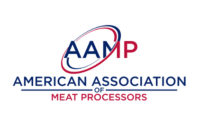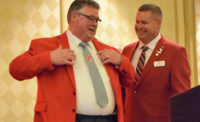AAMP Q&A
Q&A with AAMP President Louis E. Muench

AAMP’s signature red jacket, the mark of the current president of the association, was handed off at the annual convention in Lexington, Ky., this summer. The recipient and new president of the country’s largest meat industry association is Louie Muench, president of Louie’s Finer Meats. The Cumberland, Wis. Meat shop is known for its award-winning cured meat items, its top-tier service during deer-hunting season and its numerous charitable activities.
AAMP: As a processor, what are some of the major changes or trends you have seen in the industry over the years?
LM: Consumer buying habits have changed quite a bit; they aren’t as cost conscious. Consumers are not as concerned about price so much as they are health or ease of preparation. Showcases have changed from roasts to brats, kebabs, and portion cuts. This has changed the product line and has changed the labor as well. From a retail standpoint, people don’t buy the size they used to.
AAMP: What are some of the major challenges you are seeing in the industry right now?
LM: It’s hard to find the specialized help you need in this business. It’s labor intensive and hard work. With the invention of the computer, the younger generations aren’t looking for this kind of work. Our industry is laborious in production and sanitation. It’s a major challenge seeing how that will move forward.
Some regulations make sense and some don’t. If it’s actually about the testing, inspections, sanitation and training, then it makes sense. We all share the idea we want food to be safe. Paperwork and pencil pushing doesn’t necessarily make food safe.
Everyone likes fair competition. It seems there isn’t level playing field for small and medium processors. Big retailers might sell 50,000 pounds of hamburger and aren’t inspected, but we are and we sell 5,000 pounds. There should be stringent regulations for everyone. Not all retailers have daily inspection like we do. You have to have someone monitoring data loggers and taking care of paperwork and sampling. It’s a great expense for processors.
AAMP: What accomplishments would you like to see by the end of your term?
LM: I want to keep the processing end going. We don’t want to lose sight of what got this organization started in the first place. I don’t want this to become a lost art. Our convention should always have workshops and opportunities to network, and attend seminars and workshops. I think of all the great recipes that went to someone’s grave because they didn’t share. I would like to start a plan or initiative to be vigilant on trying to keep the fine art that we have going and not just about regulations and oddball things.
Another initiative is to start programs to teach youth, college students, FFH, 4-H and the like. Some processors do wonderful things with 4-H programs. Youth can learn the art and be familiar with it. They can become knowledgeable about the products and can provide consumer education. We need programs that we can send to our state associations to try and involve youth or give them ideas on how to get involved.
AAMP: What else do you want people to know about you and your leadership of AAMP?
LM: I think AAMP and the state associations are solely responsible for any success we have had. The ability to interact with academia and other processors had a lot to do with our success. I always try to bring people to conventions and get them involved. I’m empathetic to the small processor. Know that I am not a figurehead. I built my business with my family. Nothing was handed to us. We worked hard. I can relate to anyone’s problems or issues. I want anyone from the mom and pop businesses to larger companies to know that I am always available and approachable. I will help with any problems or issues they have if I can.
AAMP: What do you consider a recent success story in the industry?
LM: I think the last AAMP convention was a great success. I wish everyone knew what the convention could do for your business. The seminars, supplier showcase and ACMC were a success for the small and medium processor.
I may be biased, but the Master Meat Crafter Training Program in Wisconsin has seen great success in the last 4 or 5 years. It’s such a wonderful thing to move processing forward. It’s not only a nationwide recognized program, but international people attend as well. That’s a success story unique to the country to have this kind of program. Trade schools are hurting to teach meat cutting and such; they should create programs like this.
AAMP: What advice would you give to processors just starting out in the industry?
LM: They have to realize that it’s not a war out there. Develop a relationship with your suppliers, customers, employees, and inspectors so you can relate to their concerns. Develop that trust, and you can really move forward.
You can’t be everything to everybody. Be sure to always have high standards in your products. That may give you a license to charge more. Consumers will know your product is good or guaranteed at 100 percent. Always work hard. You can always fail, but it makes it harder to fail.
Know who your customer is. You can be innovative to a point but find out what your customer wants. You don’t need 100 different sausages, but you can have 10 really good ones. Know what the customer wants and be aware of demographics and consumer trends.
AAMP: Are there any new technologies or marketing tools you are employing to help boost sales in your business?
LM: It’s not new, but social media is phenomenal. It keeps changing every day, and we need to continue with workshops to teach it. People are using it more and more. That’s improving on a daily basis.
Consumers seem to like events like mini festivals and themed events. They start to watch for it and want to know when the next one is. Give demonstrations and sausage making classes, since supermarkets won’t or can’t do these. If you are an independent business, you have the world by the tail if you want to do these events and have the time to do it.
Promote Old World products in addition to New World products. Pay attention to what your consumer wants and do aggressive sampling. Think of the things you like when you go to a place, and do this in your business.
AAMP: What’s in the future plans for Louie’s Finer Meats?
LM: We have been busy the last year with remodeling the storefront. We want to make it look like we are progressive. We have a very modern and European look on the outside. We have a checklist for the staff to make sure store looks clean, aisles are easily accessible and bathrooms are clean. Since we have so many different products, our long-range plan is to expand our retail space and possibly do more processing off-site.
We are focused on more niche development and paying attention to what consumers want. We are increasing our production of dried-fermented products as well as increasing the size of our state inspected kitchen for the possibility of baking. I like to be progressive with the customer and making accommodations to do what I would like to do, such as the ability to teach classes.
Looking for a reprint of this article?
From high-res PDFs to custom plaques, order your copy today!




